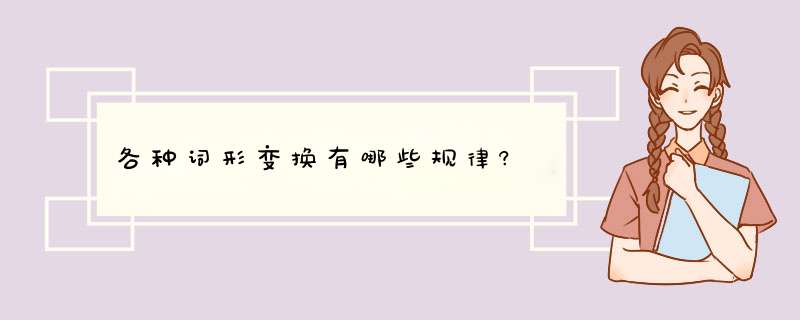
词性转换类型有:
(1)v-n动词转化为名词,
post-postage mail-mail
weigh-weight advise-advice
(2)v-n-a动词转化成名词-形容词
act-actor / actress-active
change-change-changeable
(3) v-a-ad-n动词转化成形容词,副词,名词
fill-full
need-necessary-necessarily
interest(v / n) interested /interesting
(4)n a n a名词转化为形容词
person personal ( 个人的; 私人的 )
fun funny
(5)n pl n pl名词转化为名词复数
gentleman gentlemen human humans
(6)a ad a ad形容词转化为副词
possible possibly probable probably
(7)a ad n形容词转化为副词,名词
true truly truth
lucky luckily luck
(8)原级 比较级 最高级
far farther / further farthest / furthest
little less least
还找到了另一种说明方法:
一、名词变为形容词的方法
1 在名词后面加-y可以变成形容词(尤其是一些与天气有关的名词)例如:rain—rainy, cloud—cloudy, wind—windy, snow—snowy, health—healthy, luck—lucky等
注意:1)如果名词以重读闭音节结尾,且词尾只有一个辅音字母,这时应双写词尾的辅音字母再加-y如:sun—sunny, fun—funny等
2)少数以不发音的e结尾的名词变为形容词时,应去掉e再加-y例如:noise—noisy, ice—icy 等
2 一些抽象名词在词尾加-ful可以变为形容词例如:care—careful, thank—thankful, help—helpful, use—useful, beauty—beautiful等
3 一些表示国家的名词可以在词尾加-ese, -ish或-n构成表示国籍、语言的形容词例如:China—Chinese, Japan—Japanese, England—English, America—American, India—Indian, Australia —Australian(注意Canada—Canadian)
4在名词后加-ous变为形容词例如:danger—dangerous等
5 在名词后加-ly变为形容词例如:friend—friendly, love—lovely等
6在名词后加-less构成含有否定意义的形容词例如:care—careless(粗心的),use—useless(无用的),hope—hopeless(没希望的),home—homeless(无家可归的)等
7 一些以-ence结尾的名词,把ence改为ent变成形容词例如:difference—different, silence—silent等
二、动词变为名词的方法
1词形不变,词性改变例如:work, study, water, plant等可以用作动词,也可以用作名词
2 一些动词在词尾加上-er或-or之后就变成了表示“某一类人”的名词例如:work—worker, teach—teacher, sing—singer, jump—jumper, play—player, learn—learner, visit—visitor, invent—inventor等
注意:1)以不发音的e结尾的动词,在词尾加-r例如:drive—driver, write—writer等
2)以重读闭音节结尾,且末尾只有一个辅音字母的动词,应双写末尾的辅音字母,再加-er例如:run—runner, win—winner, begin—beginner等
3 在动词词尾加-ing变成名词(方法与动词变为现在分词的方法相同)例如: meet—meeting, build—building, wait—waiting, wash—washing, swim—swimming, shop—shopping, begin—beginning等
三、形容词变为副词的方法
一般在形容词的词尾加-ly可以变成副词例如:quick—quickly, slow—slowly, loud—loudly, sudden—suddenly 等但是,以下几点值得注意:
1 一些以“辅音字母+y”结尾的形容词,要把y改为i再加-ly例如:happy—happily, angry—angrily, lucky—luckily, heavy—heavily, noisy—noisily 等
2 有些以-ble或-le结尾的形容词,去掉e加-y例如:possible—possibly, terrible—terribly等
3 少数以e结尾的形容词,要去掉e再加-ly例如:true—truly等但绝大多数以e结尾的形容词仍然直接加-ly例如:polite—politely, wide—widely等
4 以-l结尾的形容词变为副词时仍然要在词尾加-ly,而不是只加-y除非是以-ll结尾的才在词尾只加-y例如:usual—usually, careful—carefully, useful—usefully, full—fully等
你多参考一下吧
不规则的就没法儿总结了,只能靠死记硬背了
加油吧
change的名词即为原型:change
change 英 [tʃeɪndʒ] 美 [tʃeɪndʒ]
n 变化;零钱 ;v 改变
过去式: changed 过去分词: changed 现在分词: changing 第三人称单数: changes
词语用法
1、change作“改变,变化”解时是可数名词。
2、change作“找回的钱”解时,其前不加冠词,是不可数名词; 作“零钱”解其前加定冠词the,是不可数名词。
3、change后可有of短语或动词不定式作定语来修饰。
例句
1、His perception of the change came in a flash
他在一瞬间察觉到了这一变化。
2、The change in the weather has mucked up our sports timetable
天气的变化打乱了我们运动比赛的日程。
扩展资料:
近义词的用法
alteration 英 [ˌɔːltə'reɪʃn] 美 [ˌɔːltə'reɪʃn]
n 改变;变更
词汇搭配
zonal alteration 带状蚀变 relict alteration 残余蚀变
例句
用作名词 (n)
1、There is a structural alteration to the building
这座建筑物在这有一处结构上的改变。
2、The alteration would entail an expenditure of 50 pounds
此项改变将带来为数五十英磅的花费。
changed不仅是change的过去式和过去分词,也是它的形容词,其意为改变的示例:The whole fabric of the society was changed by the war战争改变了整个社会结构
从此句中可以看出,changed已经发挥其形容词作用如果把后边三个单词by the war去掉来看,其形容性效果更明显
附动词变形容词
第一,后面加able,afford-affordable;以e结尾的动词则去e加able,love-lovable:表有能力的
第二,后面加ed,scatter-scattered;以e结尾的动词则直接加d,use-used:表示被动性的属性或特点
第三,后面加ing,run-running,die-dying,变为现在分词形式,有的去e加ing,有的双写加ing,有的改为y加ing,规律同现在分词,表示有正在主动的进行的属性或特点
第四,不规则的动词则必须记忆,记住其过去分词形式规律不大,意义同上
附形容词后缀
(1)带有“属性,倾向,相关”的含义
1)-able,-ible,movable,comfortable,applicable,visible,responsible
2)-al,natural,additional,educational
3)-an,ane,urban,suburban,republican
4)-ant,-ent,distant,important,excellent
5)-ar,similar,popular,regular
6)-ary,military,voluntary
7)-ice,-atie,ical,politic,systematic,historic,physical,
8)-ine,masculine,feminine,marine
9)-ing,moving,touching,daring
10)-ish,foolish,bookish,selfish
11)-ive,active,impressive,decisive
12)-ory,satisfactory,compulsory 13)-il,-ile,-eel,fragile,genteel(文雅的)
(2) 表示“相象,类似”的含义
1)-ish,boyish,childish
2)-esque,picturesque
3)-like,manlike,childlike
4)-ly,manly,fatherly,scholarly,motherly
5)-some,troublesome,handsome 6)-y,milky,pasty
(3) 表示“充分的”含义
1)-ful,beautiful,wonderful,helpful,truthful
2)-ous,dangerous,generous,courageous,various
3)-ent,violent,
(4) 表示由某种物质形成,制成或生产的含义
1)-en,wooden,golden,woolen
2)-ous,gaseous
3)-fic,scientific
(5) 表示方向的含义
1)-ern,eastern,western
2)-ward,downward,forward
(6) 表示“倍数”的含义
1)-ble,double,treble
2)ple,triple
3)-fold,twofold,tenfold
(7) 表示“数量关系”的含义
1)-teen,thirteen
2)-ty,fifty
3)-th,fourth,fiftieth
(8) 表示国籍,语种,宗教的含义
1)-an,Roman,European
2)-ese,Chinese,
3)-ish,English,Spanish
(9) 表示“比较程度”的含义
1)-er,greater
2)-ish,reddish,yellowish
3)-est,highest
4)-most,foremost,topmost
(10)其他的含义 -less,表示否定,countless,stainless,wireless
欢迎分享,转载请注明来源:内存溢出

 微信扫一扫
微信扫一扫
 支付宝扫一扫
支付宝扫一扫
评论列表(0条)